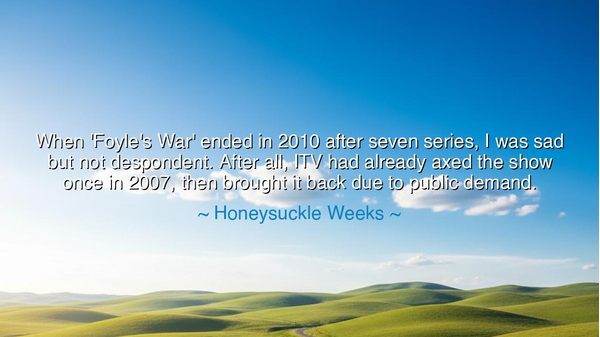
When 'Foyle's War' ended in 2010 after seven series, I was sad
When 'Foyle's War' ended in 2010 after seven series, I was sad but not despondent. After all, ITV had already axed the show once in 2007, then brought it back due to public demand.






Hear the words of Honeysuckle Weeks, who walked in the light of story and drama: “When Foyle’s War ended in 2010 after seven series, I was sad but not despondent. After all, ITV had already axed the show once in 2007, then brought it back due to public demand.” At first glance, this reflection seems bound to the fate of a single television series, yet within it rests a universal truth: the rise and fall of cherished things, the sorrow of endings tempered by the hope of return, and the power of a people’s voice to call forth life from what seemed gone.
In these words, Weeks speaks of the bittersweet nature of endings. For even when the curtain falls, there lingers the echo of applause, the memory of laughter, the imprint of characters who have become as family to those who watched. To feel sad is natural, for something loved has ceased. Yet to be “not despondent” is wisdom, for she remembers that what ends may sometimes begin again. Just as the winter strips the trees bare, only for spring to bring forth blossom once more, so too can stories return when their roots run deep in the hearts of the people.
The ancients knew this cycle well. The Greeks told of Persephone, who each year descended into Hades, leaving the earth in mourning. But by the will of Demeter and the demand of the seasons, she returned, bringing with her the rebirth of life. So it was with Foyle’s War, taken once into silence, then restored by the cry of public demand. This is no trivial tale; it is the reminder that what a community treasures may be rekindled by their united will. The voice of the many, when lifted together, carries the power to call the lost back into being.
History too offers us examples. Recall the story of Winston Churchill after the First World War, cast aside by politics, dismissed as a relic of the past. Yet in the hour of Britain’s greatest need, when the world stood against tyranny, the people called him back to lead. What Weeks observed in her own world of drama echoes this ancient truth: what seems finished may yet be restored, for no ending is absolute so long as memory and desire endure.
The sadness she names is not despair, but the gentle grief of closing a beloved book. The key is that she was not broken by it. For she had seen before that endings can be overturned, that what seems final can prove temporary. This is a teaching for us all: do not be crushed when the things you love end. Hold them in your heart, and trust that life, strange and unpredictable, may yet return them in some form. And if not, their memory itself is a kind of immortality.
The lesson, then, is to face endings with both grief and hope. Do not deny your sadness—feel it fully. But also remember: despair is not required, for life is full of surprises. What you lose today may return tomorrow, if enough hearts long for it, or if fate so wills. And even if it does not return, your remembrance of it keeps it alive in spirit, shaping your soul and your story.
Therefore, let practical action follow. When something beloved is taken from the world—be it a story, a tradition, or even a voice of justice—do not remain silent. Speak, gather, and make your desire known. For as with the fans who demanded the return of Foyle’s War, so too can communities call back what they cherish. Never believe yourself powerless; your voice, joined with others, is a spark that can re-ignite what has been extinguished.
Thus, Honeysuckle Weeks teaches us this truth: endings bring sorrow, yet not finality. The ax may fall, but the cry of the people may lift the fallen once more. And even when what we love does not return, to carry its memory with honor is itself a triumph. Therefore, grieve with dignity, hope with courage, and never forget the strength that lies in the unity of many voices. For in the end, nothing loved is ever truly lost.






AAdministratorAdministrator
Welcome, honored guests. Please leave a comment, we will respond soon